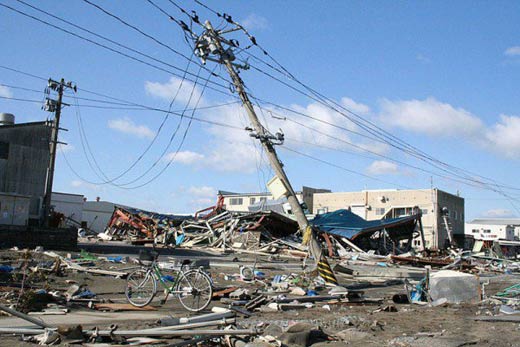當(dāng)前位置: Language Tips> 雙語新聞
Japanese taxi drivers report 'ghost passengers' in area hit by 2011 tsunami
分享到

In a chilling turn of events, some taxi drivers in Japan are claiming to have picked up ‘ghost passengers’ in the aftermath of the tsunami that devastated the nation in March 2011. As many as seven of the 100 drivers interviewed by Yuka Kudo, a student of sociology at Tohoku, admitted to having encountered phantom fares.
2011年3月,東日本海域發(fā)生地震,席卷而來的大海嘯重創(chuàng)全國。災(zāi)難過后,曾傳出的士司機(jī)在災(zāi)區(qū)載到“鬼乘客”的報(bào)道,聽來頗為駭人。就讀日本東北大學(xué)社會(huì)學(xué)系的工藤優(yōu)花采訪了百位的士司機(jī),七人承認(rèn)曾載到過鬼魂。
Kudo conducted the interviews as a part of her graduation thesis, traveling to the coastal town of Ishinomaki every week for a year to speak to taxi drivers waiting for fares. She asked over 100 drivers the same question: “Did you have any unusual experiences after the disaster?” Many of them ignored her, some even got angry, but seven drivers agreed to describe their strange encounters.
工藤優(yōu)花每周都會(huì)前往海濱城市石卷,采訪當(dāng)?shù)卣诤蚩偷牡氖克緳C(jī),為自己的畢業(yè)論文做準(zhǔn)備。一年來,她采訪了一百多位的士司機(jī),問題只有一個(gè):“海嘯過后,你碰到過什么離奇事件嗎?”不少人閉口不談,有些人甚至對(duì)她惡語相向,但其中有七人則向她講述了自己的靈異遭遇。
One driver recounted a particularly unsettling story – in the summer of 2011, a woman dressed in a coat climbed into his taxi near Ishinomaki station. She said, “Please go to the Mianmihama Station.” When he pointed out that there was nothing left standing in the district, she asked him in a shivering voice, “Have I died?” The driver immediately turned around, only to find the back seat empty.
有位司機(jī)的故事格外驚悚。那是2011年的夏天,一位身著大衣的女士在石卷車站附近坐上了他的車,并告訴他:“麻煩去南濱車站。”這位司機(jī)告訴她,南濱已在海嘯中被夷為平地了。聽到這兒,女乘客哆嗦著問他:“我是不是已經(jīng)死了?”一句話,嚇得司機(jī)趕緊扭頭,發(fā)現(xiàn)后座竟空無一人。
Another driver recalled how a young man who looked to be in his 20s got into his taxi. When the driver looked in the rear-view mirror for directions, the man kept pointing towards the front. The driver then asked for a destination, to which he replied, “Hiyoriyama” (mountain). When the taxi reached the area, the man had disappeared from the taxi.
另一位司機(jī)回憶道,自己曾載過一名20多歲的男子。他盯著后視鏡,問乘客要往哪兒開,可這名男子只是一直往前指。于是他不得不問了句,到底去哪兒?男子答道:“日和山。”當(dāng)司機(jī)開到目的地時(shí),發(fā)現(xiàn)男子早已無影無蹤了。
It’s easy to dismiss these stories as hallucinations or imaginations, but the drivers’ logs are proof that they really might have occurred. When these ‘ghosts’ got into their cabs, the drivers started the meter, which is recorded. So even though these passengers disappeared during the ride, they were still counted as clients. The drivers then had to pay their fares out of their own pockets. Some of the drivers even wrote down their experiences in their logs.
不少人會(huì)說,他們一定是產(chǎn)生幻覺了,或者故事是編的。可的士上的計(jì)程儀不會(huì)騙人啊。“鬼乘客”一上車,計(jì)程儀便開始運(yùn)作,記錄著行車全程。哪怕乘客半路消失,依舊算一次行車記錄,也就是說,司機(jī)們不得不自掏腰包,支付車費(fèi)。有些司機(jī)甚至在行車冊(cè)上寫下了他們的遭遇。
All these phantom travelers were described to be young, which compels Kudo to believe that they were indeed victims of the 2011 tsunami. “Young people feel strongly chagrined (at their deaths) when they cannot meet people they love,” she said. “As they want to convey their bitterness, they may have chosen taxis, which are like private rooms, as a medium to do so.”
據(jù)司機(jī)們的描述,所有的鬼乘客都是些年輕人,因此工藤優(yōu)花認(rèn)為,他們確實(shí)是2011年的海嘯遇難者。“年輕人死不瞑目,放不下對(duì)愛人的牽掛,”她說,“為了宣泄痛苦,他們選擇坐的士,因?yàn)榈氖靠臻g密閉,是理想的載體。”
Interestingly, none of the drivers reported feeling any fear, instead holding their special passengers in reverence. Having lost loved ones in the disaster themselves, they perceived the encounters as a spiritual experience, meant to be remembered and cherished forever. “It is not strange to see a ghost here,” a driver said. If I encounter a ghost again, I will accept it as my passenger.”
有趣的是,接受采訪的司機(jī)紛紛表示,自己并不害怕,反而對(duì)這些特殊的乘客心生敬畏。不少司機(jī)也在海嘯中失去了他們的至愛,因此,他們將搭載鬼乘客視作通靈的經(jīng)歷,值得銘記與珍惜。“在這里見鬼并不稀奇,”一位司機(jī)坦言,“如果我再載到鬼,肯定會(huì)送它到目的地。”
Kudo herself was moved by the interviews. “I learned that the death of each victim carries importance,” she said. “I want to convey that to other people.”
此番采訪,讓工藤優(yōu)花深受感動(dòng)。她說:“這些司機(jī)讓我明白了,每一位遇難者的死都意義重大。我要讓更多人了解這點(diǎn)。”
According to official records, over 15,000 people died during the magnitude-9 earthquake that lasted for six minutes and triggered a 133-ft high tsunami that swept six miles inland. Numerous sightings of ‘ghosts’ and ‘spectral figures’ have been reported in residential districts in the affected areas in the aftermath of the disaster.
官方資料稱,東日本地震強(qiáng)度高達(dá)9級(jí),雖僅持續(xù)6分鐘,卻引發(fā)了133英尺(約合40米)高的海嘯,深入內(nèi)陸達(dá)6英里(約合9.6公里),共造成1.5萬多人喪生。海嘯過后,多人曾在災(zāi)區(qū)目睹了“鬼魂”或“幽靈”出沒。
Vocabulary
reverence: 尊敬
chagrined: 苦惱的;失望的
英文來源:odditycentral
譯者:郭汪韜略
審校&編輯:丹妮
上一篇 : 想碼出好文章?慢點(diǎn)打字吧
下一篇 : 芭比推多體型多膚色版
分享到
關(guān)注和訂閱


關(guān)于我們 | 聯(lián)系方式 | 招聘信息
電話:8610-84883645
傳真:8610-84883500
Email: languagetips@chinadaily.com.cn